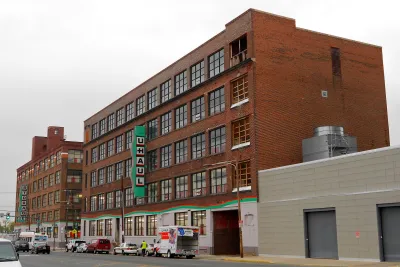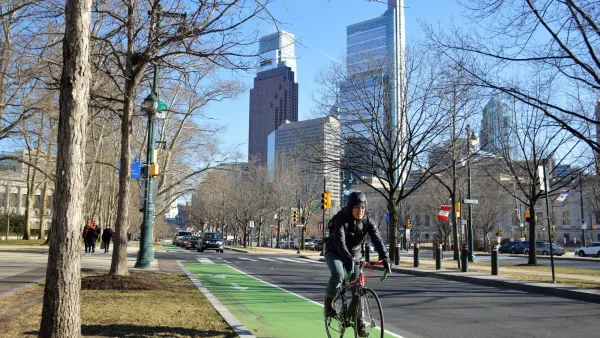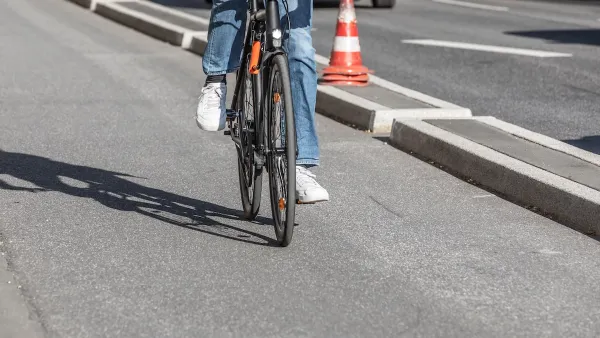The city pulled the plug on a proposed street redesign after community groups criticized the public engagement process for not listening to all local voices.

A plan to redesign a dangerous five-lane Philadelphia street by reducing it to three traffic lanes and adding parking-protected bike lanes has stalled after local opponents voiced concerns that the public engagement process didn't reach enough residents and stakeholders. As Jared Brey reports, the city's Office of Transportation, Infrastructure, and Sustainability (OTIS) developed the plan for Washington Avenue with a focus on Complete Streets principles, but ultimately decided to change the design.
"With U.S. pedestrian deaths spiking and the federal government calling for a national roadway safety initiative, Philly's surprise U-turn on Washington Avenue shows how efforts to redesign streets for multiple user groups can get complicated, particularly in gentrifying areas," Brey writes. "Road diets can be very visible signs of neighborhood change, and they’re driven by city government, so communities often associate them with a range of issues that go beyond traffic safety. Bike lanes in particular are often seen as symbols of gentrification."
Although more than 70 percent of respondents in a city survey supported the three-lane plan, some residents say they were never given information about the project or the opportunity to respond to the survey. According to Mike Carroll, deputy managing director for OTIS, the fact that the concerns came from Black, low-income communities made the office take pause and "recalled painful historical instances of destructive transportation planning done by technocrats without input from communities of color."
OTIS is going back to the drawing board and "moving forward with plans to redesign the street, using elements of the three-lane and four-lane mixed approach. The office says it will announce the construction plans at a public meeting on March 1."
The source article provides more details on the three alternatives for the Washington Avenue redesign, all of which include protected bike lanes.
FULL STORY: How a Philadelphia Road Redesign Went Off the Rails

Analysis: Cybertruck Fatality Rate Far Exceeds That of Ford Pinto
The Tesla Cybertruck was recalled seven times last year.

National Parks Layoffs Will Cause Communities to Lose Billions
Thousands of essential park workers were laid off this week, just before the busy spring break season.

Retro-silient?: America’s First “Eco-burb,” The Woodlands Turns 50
A master-planned community north of Houston offers lessons on green infrastructure and resilient design, but falls short of its founder’s lofty affordability and walkability goals.

Test News Post 1
This is a summary

Analysis: Cybertruck Fatality Rate Far Exceeds That of Ford Pinto
The Tesla Cybertruck was recalled seven times last year.

Test News Headline 46
Test for the image on the front page.
Urban Design for Planners 1: Software Tools
This six-course series explores essential urban design concepts using open source software and equips planners with the tools they need to participate fully in the urban design process.
Planning for Universal Design
Learn the tools for implementing Universal Design in planning regulations.
EMC Planning Group, Inc.
Planetizen
Planetizen
Mpact (formerly Rail~Volution)
Great Falls Development Authority, Inc.
HUDs Office of Policy Development and Research
NYU Wagner Graduate School of Public Service




























